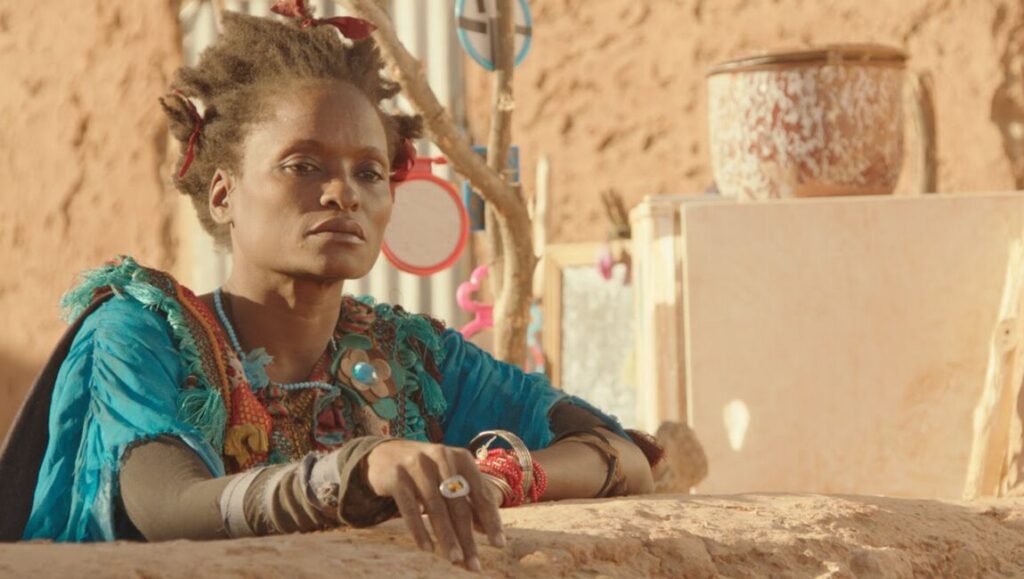In an overhead shot, a 4×4 full of jihadists crawls down a cramped village alleyway, where it’s greeted by a lanky woman in flowing colored garments, her arms outstretched and a ribbon of black cloth spreading to the outer reaches of the 2:35:1 frame. It’s a potent early image of conflict and resistance in a film that will continue to deal in such explicit cinematic terms. Later, the lyrical vision of a group of boys playing soccer, Blow-Up style, with an imaginary ball is scored to strings of Spielbergian grandiosity — that is, until a motorcycle with armed jihadists arrives and the key shifts to minor. In another instance, director Abderrahmane Sissako intercuts between teenagers playing music — one of the many expressive acts outlawed by the Allah-worshipping militants — to a gunman perched atop their roof, silhouetted by a menacing night sky while planning his attack. Such exaggerated good vs. evil cues, which give the film the character of a classical outlaws-against-settlers western, are a logical fit for a country that’s been forced into these oppositions by the continued prominence of a severe dominant ideology that allows for no wiggle room. In Timbuktu’s sand-swept expanses, you’re either willfully complicit in the butchered standards of the Muslim authorities or you’re a dangerous dissident. Via a loose, ensemble-based, anecdotal narrative style, the film’s undertaking is to pinpoint scenarios in which this binary proves incompatible with living a pleasant (no sports or partying) or even functional (mandatory gloves for females, even those selling fish) life. Augmenting the difficulty of complying with this absurd mandate is the fact that the fundamentalist goons occupying the titular desert region are very flexible with the law. They have no qualms with perverting the words of Allah to justify their own aggression, as when a pious man from the city uses force to obtain marriage with a village girl and is subsequently pardoned.
Sissako has persuasively reflected a world in which alleged insanity’s the only freedom from corruption.
Timbuktu establishes this well-oiled evil machine if only to locate its cracks; the film’s marked less by upsetting explosions of terror than quiet scenes of hypocrisy and transgression. Insofar as there’s a central storyline within the narrative tapestry, it deals with a deadly scuffle between two locals over a slain cow, but Sissako’s more taken with the tender rapport between the wronged man and his family — who dwell in an open-faced tent outside the city to avoid the oppressors — than he is with the illegal act itself (de-emphasized in a lyrical magic hour landscape shot). Indeed, the movie parcels out its more bluntly symbolic horrors (gunmen firing at a kangaroo for fun, defiling sacred statuettes, and throwing rocks at the sprouting heads of buried-alive victims) sans context as clipped digressions from the prevailing atmosphere of doomed anticipation. This approach has the effect of normalizing the violence, of making it just another part of daily life and draining it of the immediacy it should surely possess. The implication, of course, is not that the authoritative brutality is trivial, but that it’s merely an outgrowth of the greater crime that plagues the entire film: the occupation of a community through ideological intimidation. So burdened by this pressure are the town’s inhabitants that rebellion can only come in small, discreet forms, such as a refusal to let one’s hair down or an interpretive dance hidden within militant surveillance. In this sense, it’s fittingly tragic that the film’s soul lies with the woman seen in the shot cited at the top of this piece — a presumed-insane bohemian wanderer whose pursuits of happiness strike the oppressors as too strange to fit into a punishable box. Sissako has persuasively reflected a world in which alleged insanity’s the only freedom from corruption.

